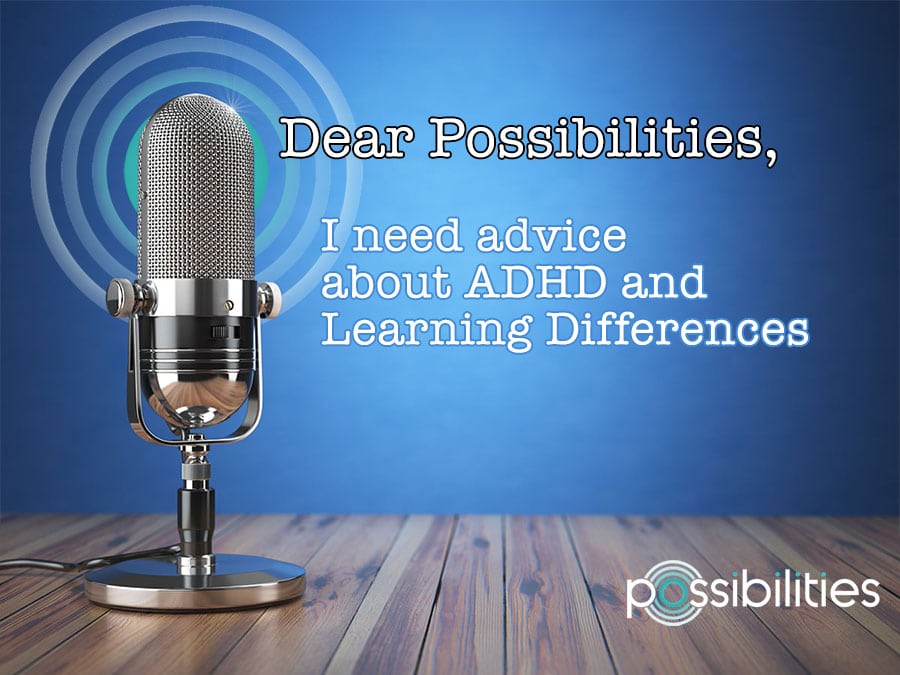Your questions about ADHD and Learning Disabilities answered by
Brenda S Miles, PhD C Psych, Clinical Paediatric Neuropsychologist and Dr. Doron Almagor, MD MRCPC, Child, Adolescent and Adult Psychiatrist


Dear Possibilities,
I was recently diagnosed with ADHD at age 61. Long story, as you can imagine. Now I’m on Concerta which has given me so much focus! I never knew it could be this way! But I’m concerned about retirement and the end of my health plan coverage. I have two questions. How can I afford to pay for this prescription as a retired person? And what’s the impact on me (or anybody, really) if a prescription is stopped, especially if it’s working.
Signed,
Never Knew It Could Be This Way
Dear Never Knew,
These questions are great for so many reasons! And readers who are far from retirement—keep reading. There are answers here that apply to you, too. Now, back to you, Never Knew…
There’s a wonderful saying that goes like this. The best time to plant a tree was 20 years ago. The second best time is now. Congratulations! Your time is now! You never knew, but now you know. Now you know that life can be different—and much better—when you take a step forward and finally get to the bottom of all those symptoms that made life tough. Maybe you’ve been forgetful, or easily distracted, or poorly organized, or inconsistent when it comes to getting tasks done. And maybe those challenges have followed you your whole life. Maybe all this time you’ve told yourself, “that’s just me.” Maybe everyone around you has said, “that’s just you”, too.
Here’s an interesting statistic. Older adults represent one of the fastest growing segments of new ADHD diagnoses compared to other ages. What does that mean? Well, older adults with ADHD have been missed in the past—and that’s probably because of myths and misunderstandings. Here’s one myth: ADHD can’t be diagnosed in older adults with other medical conditions. Well, that’s not true! And here’s another unfortunate idea: Why bother treating ADHD now if you’ve lived it with your whole life? That attitude is plain wrong, too.
You know very well, from your own up-close and personal experience, how hard it’s been trying to rise and conquer, overcoming ADHD symptoms that always get in the way. Kudos to you for soldiering on and never giving up. But that must have been exhausting, and you’ve got way more living to do!
Here’s a name you need to know. Dr. David Goodman is an assistant professor of psychiatry and biological sciences at the Johns Hopkins University School of Medicine. He’s also the director of the Adult Attention Deficit Disorders Center in Maryland. Dr. Goodman is an expert in adult ADHD and subscribes to the never-too-late-to-plant-a-tree perspective based on scientific research and success stories in his own medical practice. Dr. Goodman has written many articles for scientific publications. He also writes for CHADD’s Attention Magazine, about topics like ADHD in adults over 50 and ADHD after retirement. Dr. Goodman’s articles are a good read, and you’ll learn great news, too, like how effective ADHD treatments can be throughout adulthood, even after retirement!
Okay, now what about retirement? You’ve worked hard, and you’ve worked really, really hard, if you’ve been giving your employer your best while working through ADHD. You deserve a break, and retirement shouldn’t have a downside when it comes to treatment. Why give up on something that is helping you?
Here’s more good news. If you live in Canada, most ADHD medications in Ontario, and in many other provinces, will be free after you turn 65. Yup, that’s right. Thank you, Canada! Ask your pharmacist for more information to see if this is the case for your province. As an aside, in many provinces medications are free for individuals up to age 25, too. In the United States, prescription coverage will likely vary from state to state. Medicare offers some coverage for seniors, and Medicaid might offer some additional coverage as well. As an individual, you can contact these agencies directly. Pharmaceutical companies in Canada and the United States also have programs to help ease the cost of medications, if you don’t qualify for benefits as a senior yet or if you have limited coverage through an employer. Associations for retirees like CARP, the Canadian Association for Retired Persons, and AARP in the United States, can also provide answers long before you pack up your desk and start your New Big Life. So toss out the office stapler—and those fears about no medication after 65! There is support, and you’re going to stay productive and organized and focussed, and do all the things you dream of doing.
But wait! Before you launch your retirement countdown in days, hours and seconds, here’s something else you need to know. It’s about Concerta. And all readers who are taking Concerta need to know this, too. To be exact, we’re talking about Concerta in Canada. Research shows that generic Concerta in Canada is less effective than the brand-name medication. You can read more about the research in detail but here are the results in a single, digestible dose. Compared to brand-name Concerta, data suggest that the generic variant available in Canada is less effective at controlling ADHD symptoms and produces more side-effects.
So what does this research mean for you, and for others taking Concerta? To receive the more effective brand-name, ask your doctor to write “no substitution” on your Concerta prescription. Brand names come with an extra cost that your prescription plan may not cover.. To avoid this extra cost, download a benefits card and present it to your pharmacist. This card will work in Ontario if your physician has written “no substitution” on your Concerta prescription. You may be able to use the card in other provinces, too, so be sure to ask your pharmacist.
Untreated ADHD is serious. So it’s important to keep receiving treatment to support a long and healthy life. It’s worth emphasizing that the gold standard for effective ADHD treatment is combined, integrated treatments—and that’s true for any age. Medication is an important part of ADHD treatment, but so are supportive therapies that go along with it. Executive functioning coaching can help you stay on track and accomplish goals. Psychotherapies can help you rewrite unflattering stories you’ve told yourself, and commit to everything wonderful moving forward.
Our advice in a nutshell? Plant your tree and revel in possibilities! The best time to start is now.


ASK US A QUESTION!
Dear Possibilities is an advice column offered through the Possibilities Clinic headquartered in Toronto, Canada. Ask anything about attention, behaviour, learning, ADD, ADHD or Learning Disabilities in children, adolescents and adults and Dr. Doron Almagor, MD, a neuropsychiatrist, and Dr. Brenda Miles, CPsych, a neuropsychologist, will answer. We can’t offer specific diagnostic or treatment advice for you or your child—that would require a personalized appointment—but we’ll do our best to answer general questions. When you share what’s on your mind, we’ll know more about the kind of information you’re looking for. So, please, ask us a question. No matter where you are in the world, we’re here and eager to help! Submissions may be edited for clarity and to protect confidentiality.
To submit your question, please Mailto: q@possibilitiesclinic.com







